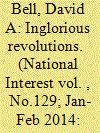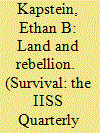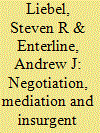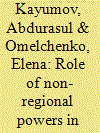| Srl | Item |
| 1 |
ID:
127453


|
|
|
|
|
| Publication |
2014.
|
| Summary/Abstract |
TWO AND A HALF years after it began, the revolution was widely considered a quagmire, even a disaster. Rebels had made disappointingly little headway against the forces of the hated tyrant. The capital and the country's second major city remained under his control. Foreign powers had provided sympathy, but very little real aid. And despite promising to respect human rights, rebel forces were committing widespread abuses, including murder, torture and destruction of property. In short, the bright hopes of an earlier spring were fading fast.
|
|
|
|
|
|
|
|
|
|
|
|
|
|
|
|
| 2 |
ID:
158525


|
|
|
|
|
| Summary/Abstract |
Russia’s evident attempts to interfere with the 2016 U.S. presidential election, as well as the plague of “fake news” and the neologism of “alternative facts,” highlight the importance of ensuring informational integrity in policymaking. Think tanks have long been a significant influence in this area and, as a result, have been increasingly targeted by foreign governments seeking to surreptitiously inject their preferences into the American policymaking process.
|
|
|
|
|
|
|
|
|
|
|
|
|
|
|
|
| 3 |
ID:
128846


|
|
|
|
|
| Publication |
2014.
|
| Summary/Abstract |
A study of land reform illuminates the paradox of economic instruments in counter-insurgency. Where redistributive demands are at the core of a rebellion, foreign powers will find it difficult to respond effectively. Recent years have seen the United States and its allies embroiled in major counter-insurgency campaigns in Afghanistan and Iraq, and lesser operations in such countries as Yemen and Somalia. These battles against local insurgencies are only the latest in a string of such conflicts that have erupted in nearly every developing region since the end of the Second World War. Sharply debated at home and abroad, they raise the fundamental question of what the counter-insurgents can reasonably hope to achieve in violent settings, even when they deploy an array of military, political and economic instruments. What are the 'moving parts' that foreign powers can manipulate in their efforts to force or encourage violence-reducing reforms in these societies?
|
|
|
|
|
|
|
|
|
|
|
|
|
|
|
|
| 4 |
ID:
133155


|
|
|
|
|
| Publication |
2014.
|
| Summary/Abstract |
How do negotiation and mediation affect the likelihood of insurgent victory in counterinsurgency (coin) wars? We develop expectations regarding the incentives of the combatants to negotiate and accept mediation while a coin war is under way, and the evolution of these incentives as a war progresses. Thirty nine civil wars are examined in which a foreign power intervenes to defend a central government against an insurgency during the period 1945-2009. We identify the subset of coin wars in which negotiations and mediation were attempted or took place, as well as their timing. The study examines whether the resort to these two instruments affects the subsequent duration and outcome of coin wars. We find that the resort to negotiations and mediation accelerates the time to insurgent victory, and explore reasons why political leaders in foreign powers would pursue such a path given the consequences of such action.
|
|
|
|
|
|
|
|
|
|
|
|
|
|
|
|
| 5 |
ID:
134117


|
|
|
|
|
| Publication |
2014.
|
| Summary/Abstract |
Water as the least regulated issue is currently one of the key security factors in Central Asia. Although some efforts are made to regulate water through the establishment of a regional water regime, yet it remains unresolved. It has been stated that the involvement of international actors can have a positive effect on the solution of the problem. The analysis in this article shows that non-regional powers do not necessarily play a positive role in Central Asia. The water and energy nexus is often used by external powers as a geopolitical tool to influence regional countries for own political and economic interests.
|
|
|
|
|
|
|
|
|
|
|
|
|
|
|
|
| 6 |
ID:
121161


|
|
|
|
|
| Publication |
2012.
|
| Summary/Abstract |
The making of the Constitution was an international event consisting of envoys from the thirteen states seeking to devise a solution to two diplomatic and security crises, that amongst the units (states and regions) of the Confederation with one another and with foreign powers. Early America is often structured as a fixed "nation" in studies of the period, but it is perhaps more accurate to classify it as comprising a state-system, one which was part of a larger international system. This article reviews how this dynamic and the role of diplomacy factored into constitutional reform in the 1780s by surveying the extant scholarship in the area and through analyzing debate at the Federal Convention and the reaction of the founders to the threat of internecine and foreign war during the Confederation. It concludes by discussing how its findings point to new lines of inquiry into the early American political experience.
|
|
|
|
|
|
|
|
|
|
|
|
|
|
|
|